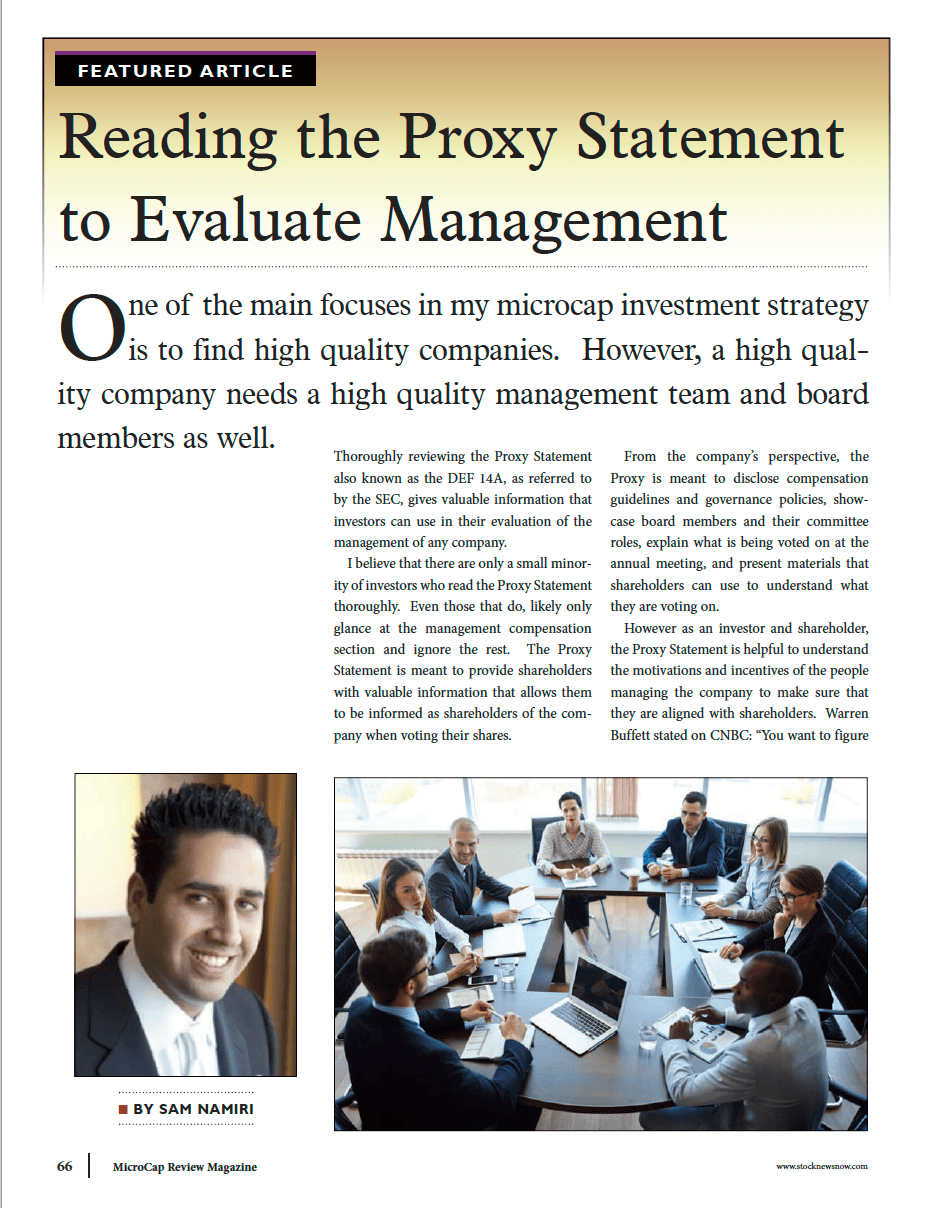One of the main focuses in my microcap investment strategy is to find high quality companies. However, a high quality company needs a high quality management team and board members as well.
Thoroughly reviewing the Proxy Statement also known as the DEF 14A, as referred to by the SEC, gives valuable information that investors can use in their evaluation of the management of any company.
I believe that there are only a small minority of investors who read the Proxy Statement thoroughly. Even those that do, likely only glance at the management compensation section and ignore the rest. The Proxy Statement is meant to provide shareholders with valuable information that allows them to be informed as shareholders of the company when voting their shares.
From the company’s perspective, the Proxy is meant to disclose compensation guidelines and governance policies, showcase board members and their committee roles, explain what is being voted on at the annual meeting, and present materials that shareholders can use to understand what they are voting on.
However as an investor and shareholder, the Proxy Statement is helpful to understand the motivations and incentives of the people managing the company to make sure that they are aligned with shareholders. Warren Buffett stated on CNBC: “You want to figure out … how well that they treat their owners,” he said. “Read the proxy statements, see what they think of —see how they treat themselves versus how they treat the shareholders … The poor managers also turn out to be the ones that really don’t think that much about the shareholders, too.”
So what are some of the key things that I look for? First I evaluate the board members and their backgrounds and prior experience. In addition to reading the Proxy to learn about their biographies and backgrounds, I run a simple web search and also look on social media to learn more about them. If I have any mutual connections, I talk to them as well to see what they think or know about the board member. My goal is to find out if the board member is an active contributor or if they are just golfing buddies with the CEO looking to cash an extra check. The easiest way to tell if a board member is truly aligned with the shareholders is to find out if he or she owns a meaningful position in the stock of the company.
The Board structure of a company is very important as well. One important consideration is whether the CEO is also the Chairman of the Board. The Chairman holds a lot of power and having both roles may vest too much authority in one person, which can potentially cause problems. Especially if the CEO is well paid yet doesn’t own many shares, his or her goal often becomes to do whatever they can to keep collecting paychecks for as long as possible. If the CEO is also Chairman then they are more likely to be able to stay in the CEO position longer regardless of performance.
Compensation is another extremely important section to analyze. Something to pay attention to is the percentage of executive compensation that is fixed versus variable. Look at the past and see the rate of increase in compensation and compare their compensation to other companies of similar size. Read about the short term metrics that the company looks at to evaluate management and what the targets are. Do these align with shareholder interests? If Earnings Per Share (EPS) is a metric that management is evaluated against for their annual bonuses, they may push for a stock buyback to lower the share count and boost EPS for their own benefit even though buying back the shares is not the best use of capital. I prefer companies that set targets and evaluate management on multi-year return on invested capital and free cash flow metrics instead of metrics that can be more easily manipulated such as EPS and adjusted EBITDA.
Equity compensation is another metric that I look at closely. I want to make sure that the company isn’t just giving out shares annually just for showing up, but truly values its shares and gives them for truly good performance. I also prefer that companies give restricted stock that vests over a few years instead of options, as this better aligns management with shareholders. When granted options, management is more likely to swing big and take more risk.
Finally, in particular with microcap companies, it is important to look at the employee agreements and severance agreements of the key executives and learn about how they benefit from a potential change in control or acquisition. You ideally want a good balance where they are incentivized to accept a good deal from an acquirer, but also not be too expensive where their payout from an acquisition would be so expensive that it deters a potential acquirer.
A few other things that are important to notice and look for in the Proxy Statement are insider ownership and how much of the company management owns, who the major outside shareholders are, whether there are different classes of shares, who the peer companies are according to the compensation consultant, perks and related party transactions and also who the auditor is and whether the audit firm has changed frequently. All of this information helps provide more data points to paint either a pretty or ugly picture of the people leading the company that you might invest in.
As a shareholder in any size company, it is important to read the Proxy Statement, however, in the MicroCap space where companies are not as much in the spotlight and are more likely to suffer with poor management and corporate governance, the Proxy Statement can be an indispensable resource in helping investors to sniff out the good, the bad, and the downright ugly.




